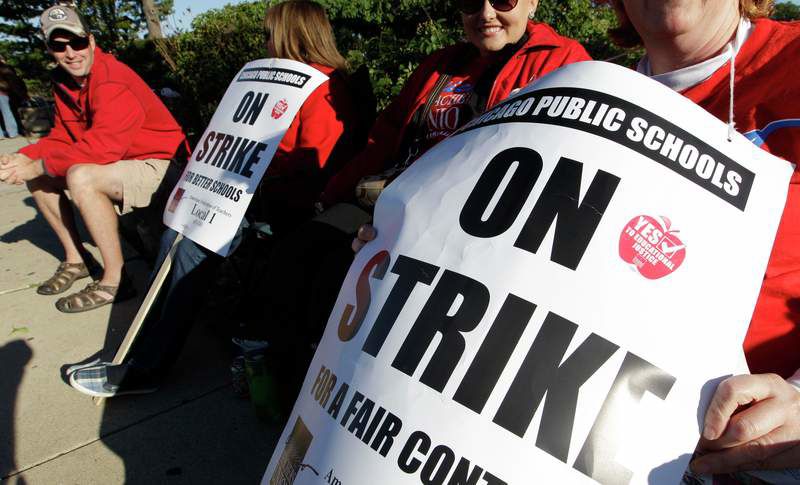Challenged by their traditional allies, teachers unions court Republicans
Published 5:00 am Tuesday, September 25, 2012

- Teachers picket outside Morgan Park High School in Chicago on Sept. 18. The Chicago teachers strike was settled, but it exposed a significant rift in the long political alliance between teachers unions and Democrats.
The strike by public school teachers in Chicago this month drew national attention to a fierce debate over the future of education and exposed the ruptured relationship between teachers unions and Democrats like Mayor Rahm Emanuel.
Over the past few years, lawmakers who have previously been considered solid supporters of teachers unions have tangled with them over a national education agenda that includes new performance evaluations based partly on test scores, the overhaul of tenure and the expansion of charter schools.
As these traditional political alliances have shifted, teachers unions have pursued some strange bedfellows among lawmakers who would not appear to be natural allies.
In Illinois, the top three recipients of political contributions from the Illinois Education Association this year are Republicans, including a candidate for the state House who has tea party support and advocates lower taxes and smaller government.
William Seitz, a prominent Republican state senator in Ohio who is a member of the American Legislative Exchange Council, a conservative business-backed group, has received more money this year from the Ohio Education Association than from any other donor.
Teachers unions in Georgia and Texas have also donated to the campaigns of numerous Republicans, and the Indiana State Teachers Association shocked Democrats this year when it decided to endorse a fiscally conservative Republican who once helped write a resolution to eliminate property taxes, a typical source of financing for public schools.
In all, teachers unions have donated $1.23 million to Republican state candidates this year, according to the National Institute on Money in State Politics.
While donations to Democrats still far outweigh contributions to Republicans, the proportion of union money going to Republican candidates this year, just over 8 percent, is its highest since 2004, according to the institute.
“The notion that just because you’re a Democrat” you can take the teachers unions for granted “has changed,” said Jim Reed, director of government relations for the Illinois Education Association.
Historically, teachers unions have been more proactive than other public sector unions in seeking partners from across the aisle.
But now, as they grapple with a reform agenda backed by hedge funds and large philanthropic donors and championed by the Obama administration as well as some conservative Republicans, the teachers unions are navigating a delicate political landscape where they increasingly pursue friends in unlikely places.
“Instead of reaching across the aisle to find support for increased funding for public education,” said Richard Hurd, a professor of labor studies at Cornell University, “they are reaching across the aisle for people who are not sold on the idea that charter schools are good, or that testing should be used for all teacher evaluations, or that teachers should lose job security.”
At the national level, the National Education Association says it does not monitor or influence state decisions on political endorsements. But Mary Kusler, director of government relations for the association, said it backed national candidates who “would not be a normal thought for us to support.”
Such cross-party alliances have attracted the scrutiny of advocacy groups on the other side of the education debate, groups that unions have criticized for pouring money into the campaigns of candidates of both parties who support easing limits on charter schools and abolishing teacher seniority rules. Students First, the group run by Michelle Rhee, the former chancellor of the school system in Washington, D.C., provided The New York Times with a list of candidates who had received campaign donations from teachers unions, which The Times has independently verified.
Students First has contributed nearly $640,000 to Republicans in this election cycle. The group, one of several well-financed organizations that have contributed money to candidates who support their education agenda, has also donated almost $1.4 million to Democrats.
Tim Melton, legislative director of Students First, accused the teachers’ unions of hypocrisy, pointing out that many of the state candidates supported by the unions are members of the American Legislative Exchange Council, an organization that both the American Federation of Teachers and the National Education Association have condemned for its education agenda, which includes vouchers, charter schools and test-based evaluations.
“I’m greatly surprised that they would attack us ferociously for something they are doing themselves,” Melton said.
Union officials say they are just being practical.
“It doesn’t do a whole lot of good to shut out the Republicans who at least have the potential to be friends of the public schools,” said Clay Robison, a spokesman for the Texas State Teachers Association.
With many Democrats now supporting reforms that make teachers wary, some Democrats suspect the unions of supporting opponents as a form of punishment.
In Indiana, Larry Grau, state director of Democrats for Education Reform, a group that supports test-based evaluations and the expansion of charter schools, said he viewed an endorsement of Brent Waltz, a conservative state senator, by the political action committee of the Indiana State Teachers Association as “the teachers union trying to send a message to Democrats.”
Waltz, who voted against a bill that would have restored $150 million in state education financing, is running to keep his state Senate seat against Rep. Mary Ann Sullivan, a founding member of Democrats for Education Reform in Indiana who was the only Democrat to champion an education bill that tied teacher pay and promotions to performance.






